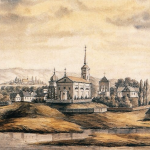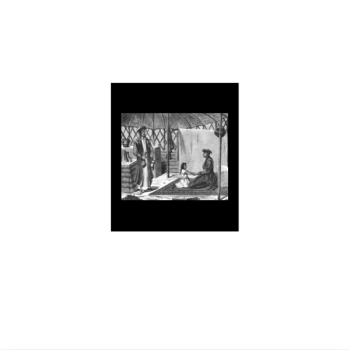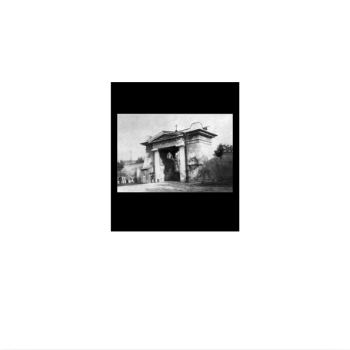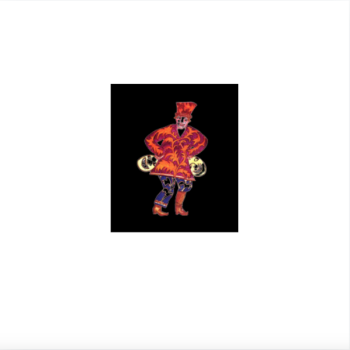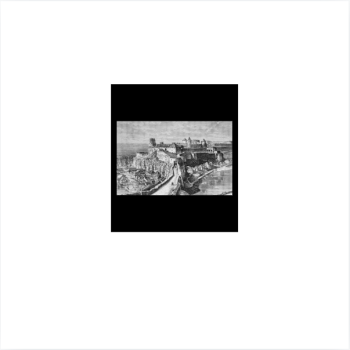A Tournament Of Shadows:
XXV. L’Homme Rouge
When the enemy was expelled from the borders of Russia, Mikhail Ilyich and his command were ordered to return to the Oginsky Canal. Andrei Mikhailovich was briefly allowed to stay with Elena Pavlovna in Rzhyshchiv for “La Lune de Miel” (Honeymoon.) In May he, too, was ordered to Oginsky Canal, where he stayed for two months with his parents. His brother, Pavel, who was also there, told many stories about what he had witnessed during the war. Pavel had become very ill after the Battle of Borodino. After spending two months recovering in Kaluga, he set off to rejoin the army, which was pursuing the retreating French. Between Mozhaysk and Borodino, Pavel saw a wounded French soldier on the road. The suffering enemy begged Pavel to take him to a field hospital. Pavel helped him into the carriage, but they were soon met with a detachment of Cossacks (who were constantly sneaking along the roads.) Seeing a French officer, the Cossacks stopped the carriage and demanded that Pavel hand him over. Despite Pavel’s admonitions, the Cossacks announced that if he did not comply, they would shoot the Frenchman on the spot. The French officer, realizing what was happening, jumped out of the carriage to make his escape. He was immediately stabbed to death by Cossack pikes.
To spend more time with Elena Pavlovna, Andrei Mikhailovich began looking for a new job somewhere near Kiev. In the autumn of 1813, he returned to Rzhyshchiv where he remained until the beginning of 1814. On January 11, Elena Pavlovna and Andrei Mikhailovich’s first child, Helena Andreevna, was born in Alexandra Andreevna’s arms. (The woman whom Prince Pavel Vasilyevich rescued in Turkey.)[1] Andrei Mikhailovich had a very pleasant time during this period. His only trouble was a perennial throat ailment which he suffered from since childhood. An acquaintance of his named Atterberg, having suffered from a similar ailment, suggested, as a remedy, wearing around his neck a black ribbon that was blessed by the Patriarch. (Andrei Mikhailovich took the advice, and never suffered again from the illness.)[2]
The Tsar, meanwhile, was en route to France. The sound of arms had finally ceased, after twenty-five years, from one end of Europe to another. Russia was at peace on all her frontiers, for the war in Persia ended with the Treaty of Gulistan.[3] Russia subsequently annexed the Khanates of Ganzha (renamed Elizavetpol,) while Persia ceded Dagestan, Eastern Georgia, most of Azerbaijan, and Northern Armenia (Karabakh, Shirvan, Derbent, Kuba, Baku, and part of Talysh.) This victory also granted Russia the exclusive right to navigate warships on the Caspian.[4]
~
In Paris, Napoleon was waiting for the inevitable. Having shut himself up in his room at the palace on the morning of January 1, 1814, he instructed Count Mole (Counselor of State) to remain in an adjoining room and to admit no one to the royal presence.
“Halt!”
Just as Mole walked into the hall, he saw a guard speaking to a man wearing red trousers, a red blouse, and a red cap.
“The Emperor is busy and must not be interrupted,” Mole interjected.
the Red Man grew impatient and declared he
“I must see Napoleon, and him alone,” said the mysterious stranger. “I must see him! Tell him the Red Man is waiting for an audience.”
Trembling violently and awed to speechlessness at the imperious tone of the red apparition, Mole tiptoed to the door of Napoleon’s royal chamber and announced the presence of the Red Man. Napoleon’s arms dropped nerveless to his side, and the costly mirror which he was holding fell to the ground, shattering into a million pieces. His skin was blanched as white as a ghost. It was clear that the announcement had completely unnerved him, yet he managed to give orders for the unwelcome guest to be admitted. After the door was closed, Mole (prompted by curiosity) held his ear to the door and listened.
“This is the third time I have appeared before you as a man,” the Red Spectre said to Napoleon. “The first time we met was in Egypt, at the battle of the Pyramids; the second, after the Battle of Wagram. On the occasion of our meeting at Wagram I granted you four more years in which to terminate the conquest of all Europe or to make a general peace, threatening that if you did not perform one of these two things within the allotted time, I would withdraw my protection from you. Now I have come for the third and last time to warn you that you have but three short months of power. In three months from this hour the Allies will be invading Paris if you do not take my advice and sue for peace. A general peace must be perfected within ninety days, else otherwise your power will be confined to a small, bleak island of the sea; so remember, all will be over with you if you do not achieve a conquest or accede to peace.”
Napoleon expostulated with the wraith in vain, who sat with as much ease in the presence of Napoleon as Napoleon himself would in the presence of a commoner.
“It will be entirely out of the question to either conquer or make peace on honorable terms in the short space of three months,” said Napoleon.
“Do as you please, but I will not change my resolution,” said the Red Man, opening the door. “Now I go.”
The crimson stranger strode down the hall, followed by Napoleon and Mole (who pretended to have been standing on guard at the second door from the room in which the conversation was held.”
“Wait,” Napoleon implored of the Res Man.
“Three months!” shouted the specter, disappearing at the end of the hall. “No longer!”
~
By March 1814, Russia and her allies were in Paris. The occupying forces created a cultural ecotone in the French capital. It was said that the Russian soldiers were even responsible for the creation of that most quintessential of French institutions—the “Bistro.” The Russian soldiers who frequented the quaint eateries on Elysian Fields Avenue demanded that their food and drink be brought quickly. “Bystro! Bystro!” they would shout. This was adopted by the French and used to designate any small restaurant.[5] Four days after the Russians entered the city, Napoleon abdicated the throne. All his possessions were wrested from him, and he was made sovereign over the little island of Elba.[6] Tsar Alexander Pavlovich ordered Count Lieutenant-General Pavel Shuvalov to accompany him. To assist Napoleon in evading recognition by the crowds, Shuvalov offered him his great greatcoat. In gratitude, the dethroned emperor gave his sword to Shuvalov, who took it to Russia.[7]
SOURCES:
[1] Zhelihovskaya, Vera Petrovna. “Helena Andreyevna Hahn, Zeneida R-va.” (1885.) [Preparation of the text and comments by A.D. Tyurikov. Bahmut Roerich Center; “Letter From E. A. Hahn To Natalya P. Dated January 10, 1839. [Kamenskoye Village, Ekaterinoslav Province.]” [Preparation of the text and comments by A.D. Tyurikov. Bahmut Roerich Center. Originally published in: Gershenzon, M.O. “Russian Woman Of The ‘30s.” Russian Thought. Vol. XII, C. 55 (December 1911.)
[2] “The late Countess B. never allowed any of her children to commence a journey on a Monday or a Friday; and pieces of black ribbon which had been blessed by the Patriarch, she presented with great ceremony to her friends as a sovereign remedy for a sore throat. Many persons in the same rank of life believe in the efficacy of charms which they hang round their children’s necks to keep off convulsions.” [Captain Jesse. Notes Of A Half-Pay In Search Of Health: Or, Russia, Circassia, And The Crimea In 1839-1840: Vol. I. James Madden And Co. London, England. (1841): 258.]
[3] Joyneville, C. Life And Times Of Alexander I.: Emperor Of All The Russians: Vol. III. Tinsley Brothers. London, England. (1875): 119-120.
[4] Ledonne, John. “Building An Infrastructure Of Empire In Russia’s Eastern Theater, 1650s-1840s.” Cahiers Du Monde Russe. Vol. XLVII, No. 3. (July-September 2006): 581-608.
[5] Gould, David L. Studies In Etymology And Etiology: With Emphasis On Germanic, Jewish, Romance And Slavic Languages. Universidad de Alicante. Alicante, Spain. (2009): 20.
[6] Wright, John W. “The Unusual, Ghostly, Superstitious, Queer: Napoleon’s Red Spectre.” Current Literature. Vol. XVIII, No. 3 (March 1895): 225.
[7] “Napoleon’s Sword.” The Crete News. (Crete, Nebraska) August 1, 1940.


